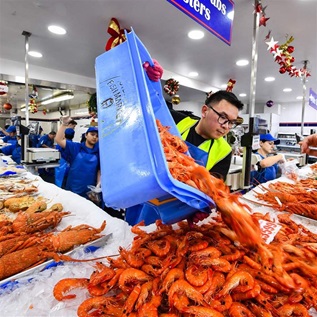Environmental NGOs Criticise Lack of Public Participation and Transparency of Spanish Government in World Fisheries Ministerial Conference
NGOs committed to the sustainable use and conservation of fisheries resources are concerned with the lack of transparency and communication of the Spanish Minister of the Environment, Rural and Marine Affairs, Elena Espinosa concerning preparations for the 5th World Conference of Fisheries Ministers (1) in Bayona, Spain, next week. The Spanish Government has invited to next week's conference more than 60 Fisheries Ministers from the five continents to adopt a ministerial declaration bound to guide the future policy of sustainable fishing worldwide.
“While Spain gathers Fisheries Ministers behind closed doors to discuss how to tackle illegal fishing, pirate fishing vessels like the ‘Eros II' could be sheltering in nearby harbours despite express EU prohibition” (2), said Xavier Pastor, European Director of Oceana, an NGO specialized in fisheries resources conservation and in marine ecosystems management.
Despite repeated attempts by the NGOs Ecologistas en Acción, Greenpeace, Oceana and WWF-Spain to obtain information about the content of the draft Bayona Declaration, the Spanish Minister has not provided any details. Furthermore, a proposal by the Pew Environment Group's European Marine Programme, to organise a dialogue with the participants on the eve of the conference was vetoed by Spain's Secretary of State for the Sea, Juan Carlos Martin Fragueiro.
Environmentalists have noted that next week's Ministerial Conference in Bayona is taking place on the eve of important negotiations at the UN General Assembly on ocean management. While the majority of inter-governmental organisations have considerably improved transparency in recent years, NGOs wonder why the Spanish Government is gathering so many Fisheries Ministers behind closed doors in Bayona one day before the UN meeting. “Less than three months before the Spanish Government takes on the presidency of the European Union, their secrecy is setting a bad precedent”, said Monica Verbeek, Executive Director of Seas-At-Risk, a European NGO coalition headquartered in Brussels.
“A year and a half after the Spanish Prime Minister Jose Luis Zapatero decided to merge the Environment and Fisheries administrations, there is a widespread perception that the Spanish administration has forgotten that it is meant to represent the interests of the entire population, and not just the fishing industry”, said Sebastian Losada, Greenpeace international's Marine Policy Advisor. “It looks like the Minister and the Secretariat of the Sea haven`t ‘changed the chip in their heads', and act behind the back of environmentalists.”
The ministerial conference on September 16th is going to be preceded by a series of presentations in what the Spanish Government is calling the 1st Summit on Fisheries Sustainability (3), with almost no NGO participation and any space for dialogue. Within this framework, a 15 minute presentation by a representative of WWF has been scheduled. “WWF has accepted the organisers' invitation, despite being the only environmental voice there”, said Raúl Garcia of WWF-Spain. “The offer made to us is very poor and we coincide with the rest of the NGOs in that our ministry still has a steep curve to climb before it can claim a real environmental stakeholders' participation with a level of dialogue equivalent to what the fisheries industry and other sectors enjoy."
Notes to the Editor:
1. Web page about the conference on the website of the Spanish Ministry for Environment, Rural and Marine Affairs
2. Oceana press release, 4 September 2009
3. World Summit on Fisheries Sustainability website
For more information:
Oceana:
Maria José Cornax, Fisheries Officer
Phone: +34 911 440 880:
Samuel Martin-Sosa Rodriguez, International Desk
Phone: + 34 686 96 14 86
Greenpeace:
Sebastian Losada, Marine Policy Adviser
Phone: + 34 626 99 82 54
WWF:
Rául García, Fisheries Officer
Phone: + 34 630 83 42 67
Pew Environment Group Marine Programme:
Rémi Parmentier +34 637 557 357
Domitilla Senni +39 3498225483











